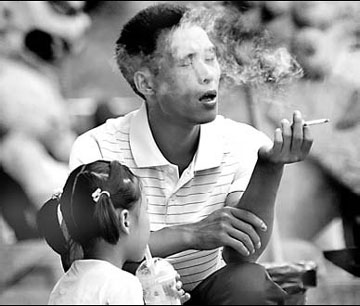Save the children from second-hand smoke and cancer. That is what the World Health Organization (WHO) wants the grown-ups to do today - World Cancer Day. The year-long smoke-free childhood campaign is the first global initiative of its kind.
WHO has joined the International Union Against Cancer (UICC), a global consortium of cancer-fighting organizations, in the initiative and given it a slogan: "I love my smoke-free childhood".
A man ignoring a little girl's presence enjoys a puff in Nanjing, capital of Jiangsu province. Such acts, say WHO, make children more vulnerable to second-hand smoke.
Cancer is one of the leading killers across the world, with WHO estimating it would claim 84 million lives between 2005 and 2015 if people don't change their habits.
Since children deserve a cleaner atmosphere in these times of high pollution and global warming, WHO is asking parents not to smoke at home and in cars.
In fact, UICC will launch a design competition for a logo for a "smoke-free" home and car.
The winning piece, to be awarded $5,000, will be announced on May 5.
The theme for this year's World Cancer Day is "Children and second-hand smoke exposure".
As many as 700 million children, or about half of the total across the world, breathe air that has been polluted by tobacco smoke, particularly at home.
Speaking about the importance of the initiative, UICC Executive Director Isabel Mortara says: "Forty percent of cancers are preventable through healthy habits.
The first step toward prevention is education, starting with parents and children. Every success story means fewer lives lost.
Tobacco-related cancers lead the list of preventable deaths and hundreds of thousands of people who have never smoked die each year from diseases caused by second-hand smoke."
That explains why parents are the focus of the year-long campaign, even though its aim is to save the children.
"Second-hand smoke is a health hazard for you and your family," Mortara says. "There is no safe level of exposure to second-hand smoke."
People who smoke in confined spaces such as homes or cars subject others to a dangerous mix of toxins and carcinogens even when windows are open. UICC's 40-page report, "Protecting our children from second-hand smoke", on the health of kids exposed to tobacco smoke and pollution, recommends safeguarding them in confined spaces, as well as schools, childcare centers and other public places.
The report says second-hand smoke can cause sudden death of a newborn, harm its lungs' development and reduce its weight if the mother is exposed to smoking.
At the same time, it can also lead to bronchitis and pneumonia among infants and slightly older children.
The WHO and UICC say parents don't have to change their habits radically to protect the children.
Here is the simple advice to parents:
Avoid smoking at home and in cars;
Warn children to stay away from second-hand smoke and keep them away from places where smoking is allowed;
Teach kids that there is no safe level of second-hand smoke;
Do not smoke while pregnant or near someone who is pregnant;
Use a smoke-free childcare center;
If you are a smoker, ask your doctor what you can do to give up smoking;
Become a role model for your child - do not smoke.
Parents have also been asked to eat a balanced diet, learn about vaccines for liver and cervical cancers and avoid over-exposure to the sun.
The campaign targets decision-makers, too, asking them to put cancer on their agenda.
A lot of countries have realized how serious a health and financial hazard smoking can be, and passed laws, banning smoking in all closed public places.
"Countries with 100 percent smoke-free laws should be commended for their legacy to healthier families," says UICC President Dr Franco Cavalli, because "in these nations the percentage of children exposed to second-hand smoke has decreased over time. Though the trend is encouraging, it alone cannot protect children from second-hand smoke. That's why educating parents is so crucial."
(China Daily February 4, 2008)






